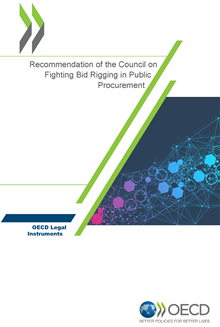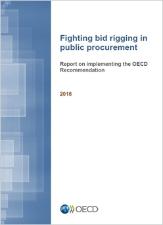Competition
OECD Recommendation on Fighting Bid Rigging in Public Procurement
Download the text of the RecommendationEnglishFrançais
On 17 July 2012, the OECD Council adopted a Recommendation on Fighting Bid Rigging in Public Procurement that calls for governments to assess their public procurement laws and practices at all levels of government in order to promote more effective procurement and reduce the risk of bid rigging in public tenders. The Recommendation was revised by the OECD Council meeting at Ministerial level on 8 June 2023, to take into account developments in competition law enforcement since 2012 and incorporate global good practices. The Recommendation is a step forward in the fight against collusion in public procurement that the OECD has been leading for a long time especially through the issuing of the 2009 Guidelines for Fighting bid rigging in Public Procurement and the work related to its dissemination worldwide.
Access other OECD Recommendations on Competition Law and Policy |
Rationale for the RecommendationPublic procurement is an essential government activity that affects a country’s economy. OECD countries spend approximately 12% of their GDP in public procurement. This percentage can be higher in developing countries. Efficient and competitive procurement processes are thus key to obtaining goods and services at the best value for money to the benefit of taxpayers, end consumers and users of public services in general. However, certain rules that govern procurement, the way in which a tender is carried out and the design of the tender itself can hinder competition and promote collusion arrangements or bid-rigging conspiracies between competitors. The 2012 Recommendation together with the Guidelines for Fighting Bid Rigging in Public Procurement are therefore essential instruments that help OECD governments reduce such anti-competitive practices and find effective ways of detecting with them. VIDEO: Bid rigging explained in 7 minutesHelp us implement the recommendation and fight bid riggingThe Secretariat is strongly committed to support OECD and non-OECD governments with the implementation of the Recommendation for Fighting Bid Rigging in Public Procurement and its Guidelines. To this purpose, the OECD has developed a standard training programme for procurement officials on the implementation of the two checklists included in the Guidelines with real case studies from around the wold and hypothetical cases. Other specific training is also available for competition officials. If you are interested in seeking the OECD support in your fight against collusive practices, please contact the Secretariat at Despina.Pachnou@oecd.org or Antonio.Capobianco@oecd.org. |
|
Documents and links
2016 Report on implementing the OECD Recommendation on Fighting Bid Rigging in Public Procurement
The resulting report shows how competition and public procurement agencies have been using the 2012 Recommendation to raise awareness of bid rigging risks and develop tools to prevent and detect bid rigging in public procurement. The Recommendation was often reported as being the basis for national strategies to fight bid rigging, helping public entities to design tenders that promote effective competition and develop tools to detect bid rigging. The review also concluded that the Recommendation is relevant and continues to be a solid basis for better competition in procurement markets. Read the report (pdf) Lire le rapport (pdf)
|
Summary of June 2016 joint meeting between the Competition Committee's WP3 and the Working Group on Bribery in International Business TransactionsOECD recommendation on Public ProcurementMore about the OECD Guidelines for Fighting Bid Rigging in Public Procurement
Countries like Mexico, Colombia and Argentina have already partnered with the OECD to improve procurement practices and step up their fight against bid rigging. Argentina: 2019 Report on fighting bid rigging in the procurement of public works in Argentina Mexico: More about the Mexico-OECD partnership and related reports Colombia: 2014 report on fighting bid rigging in public procurement in Colombia Guidelines: Download the text of the guidelines (Available in 26 different languages) |
See alsoOther OECD Recommendations on Competition Law and Policy |
Related Documents


